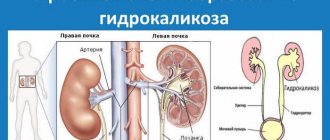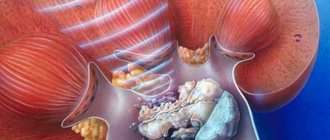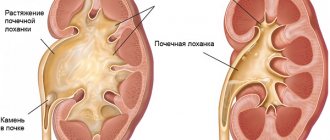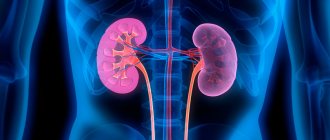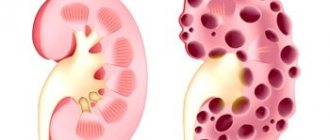Many people are interested in the question of how smoking and kidneys are related. At the same time, many cannot imagine their life without smoking several cigarettes a day.
Our body is an amazing mechanism that fights the consequences of our lifestyle every day. One of the main roles in the processes of cleansing harmful substances and releasing them to the outside is played by the kidneys. Every day they filter 1700-1800 liters of blood, but a smoker’s kidneys, alas, cope with this task only by a few percent.
Effect of cigarettes on the kidneys
One of the main organs for ensuring normal life activity is the kidneys. The main function of the paired organ is to remove excess fluid, toxins and substances not involved in metabolic processes from the body. They help make the blood clean and represent a kind of filtering system.
Cigarettes can cause the following changes in kidney function:
- Tobacco smoke causes vasoconstriction. There is a deterioration in blood microcirculation inside the organ.
- Cell nutrition is disrupted, which leads to kidney failure.
- The functionality of the organ decreases; heavy metals contained in tobacco smoke settle inside the organ in the form of stones.
- Disruption of the urination process. A person may begin to experience unpleasant pain. Immunity is reduced due to exposure to toxic substances, so the genitourinary system is vulnerable to infectious diseases. It becomes more susceptible to inflammation.
In just one minute, a healthy organ manages to purify 1.2 liters of blood; after the internal filtration system, it returns to the bloodstream. Substances that have no value are eliminated naturally along with excess fluid.
Statistics related to the study of problems with work have established that a smoker’s kidneys are 3 times more susceptible to the following diseases:
- cancer;
- inflammation;
- hydronephrosis;
- renal failure;
- the appearance of stones;
- glomerulonephritis;
- paranephritis.
Smoking releases hormones, including vasopressin. This hormone causes instability in blood pressure. Constant jumps in blood pressure negatively affect the kidneys.
Vessels either expand or narrow, the vascular walls become thin, as a result of which, with a sharp increase in pressure, the vessel can be damaged. As a result of internal bleeding, blood clots may appear when urinating.
Kidney stones as payback for smoking
Urologists at Barts Hospital have noticed that over the past 6 years the number of people needing surgery to remove stones has doubled. In 2010, about 400 people applied for urolithiasis. And already in 2020, the number of patients with this diagnosis increased to 800. Such an active increase in diseases is associated with the fact that the number of smokers in the world is constantly increasing and cases of these pathologies more often appear in people with this addiction.
Tobacco addiction has reached teenagers as well. In the United States, some studies have been conducted to study the effects of tobacco on their health. The data is simply staggering. 7516 participants aged 12 to 17 years were examined. They were questioned and tested.
Adolescents who were exposed to nicotine had small changes in the distribution of estimated glomerular filtration rate, which has a significant impact on kidney function. An association was also found between nicotine levels and increases in albumin creatinine. This is observed not only in adults, but also in adolescents.
If your kidneys hurt from smoking
Many smokers complain that their kidneys hurt after smoking. Such pain may occur due to deformation of the organ. In this case, you need to pay attention to the presence of the following signs:
- The appearance of edema;
- General malaise;
- Feeling tired;
- The appearance of discomfort when urinating;
- The volume of fluid removed has significantly decreased;
- Bloody discharge appeared;
- Local pain.
As already mentioned, a smoker’s kidneys are more susceptible to inflammatory processes. However, it is quite difficult to independently determine what caused it. Treatment is prescribed individually.
Usually the doctor prescribes local medications. The organ has the ability to regenerate, but it recovers quite slowly.
When smoking, the regenerative ability of the kidneys decreases, and regeneration occurs two times slower than in people leading a healthy lifestyle. In complex cases, if the organ is seriously damaged due to illness, surgery may be necessary.
If your kidneys hurt after smoking, try to see a doctor. The doctor will prescribe a comprehensive diagnosis, during which the true cause of the pain will be identified. Correct and timely diagnosis is the first and important step in treatment.
What will be the consequences of the influence on the body?
All effects of cigarettes can be divided into acute and chronic. The acute effect is the ability of nicotine to constrict blood vessels and increase blood pressure . In this case, the renal arteries also succumb to this influence, and renal filtration is reduced by an average of 15-18%.
This leads to water retention in the body, an increase in the volume of circulating blood, and even greater stress on the heart , which the body tries to reduce by increasing filtration. Normally, appropriate mediators are released to relax the renal arteries, but this does not occur due to the action of nicotine. A vicious circle is formed.
Chronic exposure to nicotine contributes to the development of chronic renal failure . This is due to spasm of the renal arteries and damage to the kidney filtering system. In addition, the renal arteries are also susceptible to the development of atherosclerosis , which will lead to a decrease in their lumen.
Damage to kidney elements at the initial stage will lead to a decrease in another function - participation in the formation of red blood cells. This means that the number of red blood cells will decrease, and the delivery of oxygen to the cells will decrease even more, tissue hypoxia will begin .
The most dangerous is cerebral hypoxia, which complicates smoking therapy and reduces motivation to quit cigarettes.
In addition, smoking complicates the course of diseases that are characterized by kidney damage. For example, diabetes mellitus . It is worth saying that in type 1 diabetes, nicotine affects only the kidneys, and in type 2, kidney damage occurs due to stimulation of the development of diabetes and hyperglycemia.
Stones in the kidneys
Stones form over a long period of time and are most often calcium in composition. The main reason for their development is metabolic disorders:
- Lack of vitamin B6 and magnesium. This happens more often in smokers because nicotine distorts metabolic pathways and changes the process of digesting proteins and fats. In this case, antioxidants – vitamins – are used. But when smoking, the mucous membrane of the stomach and intestines often suffers, so the absorption of vitamins from food is reduced. For the same reason, the absorption of magnesium, which is responsible for the absorption of calcium, is impaired.
- Decreased calcitriol synthesis. The function of the kidneys is also to synthesize this hormone, which ensures the reabsorption of calcium into the blood. In conditions of poor absorption of calcium and increased excretion in the urine, these ions settle in the kidney tubules and form stones.
- Nicotine stimulates the adrenal cortex, resulting in increased release of the stress hormone cortisol. Its functions are to increase free glucose in the blood, leading to diabetes. It also affects water-salt balance and mineral metabolism.
Risk of kidney disease
When smoking cigarettes, kidney disease develops faster than in non-smokers. But it is impossible to accurately assess the risk, because it is necessary to take into account factors such as concomitant diseases, age and the reserve capabilities of a particular organism.
Among other diseases, the worst thing is the development of cancerous tumors . Recent studies say that smokers develop kidney tumors 3 times more often than ordinary people. This is due to the carcinogenic effect of tobacco smoke.
Tobacco smoke also causes bladder cancer , which means there is a high risk of cancer cells entering the kidney through the ascending route. Moreover, the rate of tumor development in a smoker is higher .
Insufficient excretion of water and sodium, an increase in circulating blood volume, stimulation of atherosclerosis, disruption of erythropoiesis - all this, if not lead to the development of hypertension , will definitely aggravate its course.
Kidney pain after quitting smoking
In medical practice, patients often turn to doctors with a complaint that after quitting smoking their kidneys begin to hurt. With what it can be connected?
After quitting smoking, the paired organ begins to actively cleanse the blood of nicotine within two hours . The substance is excreted from the body through the genitourinary system. At the same time, if a person has smoked cigarettes for a long time, it becomes difficult to immediately completely remove all toxic substances.
After just eight hours, the level of carbon monoxide drops sharply, and oxygen begins to enter the blood. The vessels dilate. This includes enlargement of blood vessels. This effect can lead to short-term discomfort. It is necessary to wait out the withdrawal syndrome. Within twelve hours, the blood will be cleansed by the paired organ from carbon monoxide.
If after a day or two the pain does not go away, then the problem with the genitourinary system may not be related to quitting smoking. These may be inflammatory processes, so you need to consult a doctor. In accordance with the identified problem, the specialist will prescribe treatment.
In the last stage of renal failure, the patient receives a kidney transplant. The doctors were asked whether it is possible to insert a kidney from a smoker? An unequivocal answer was received to this question. No, it’s impossible, if a person decides to voluntarily donate his own healthy organ, then he should not have bad habits.
How does smoking worsen the condition of a transplanted kidney?
After transplantation, the organ must “get used” to the new body. Therefore, it does not begin to function immediately. A correct lifestyle after the transplant helps the bean-shaped organ to adapt and start working. Smoking promotes rapid rejection, which can occur a few days after surgery. If a person continues to smoke with a kidney transplant, the rejection may become chronic. Late graft failure is a consequence of chronic nephropathy of the donor organ. The main consequence of smoking after bean-shaped organ transplantation is fibrous thickening of the inner lining of the walls of the renal arteries.
How to cleanse your kidneys after smoking?
The paired organ experiences severe stress not during smoking, but after it, as it begins to remove substances from the body only after two hours. When quitting smoking, withdrawal syndrome often appears.
To alleviate discomfort and help the kidneys perform their own function, you can follow the following methods:
- Drink a normal amount of water, preferably 1.5 to 2 liters per day. The liquid will help get rid of toxins and also reduce swelling;
- Take vitamins A, D and C, which are responsible for the normal functioning of the organ.
- Drink lingonberry decoction. The berry is rich in microelements and also has an anti-inflammatory effect.
To prepare the decoction, you need to take 3 tablespoons of berries and soak them in boiling water for 10-15 minutes. Add sugar if desired. Drink warm. The decoction must be taken for two months.
The danger of addiction during transplantation
The main task that doctors face during transplantation is to prevent organ rejection. When smoking, this risk increases many times , since smoking is the entry of foreign particles into the bloodstream.
The immune system reacts to foreign agents. With a single exposure to antigens, the immune system does not develop a full-fledged immune response. But with systematic intake, a hyperreactive state develops, that is, the immune system reacts inadequately to foreign particles. For the same reason, the risk of developing autoimmune diseases .
Smoker's prospects
If you continue to smoke, there is a possibility of the formation of pathologies such as cancerous tumors.
The main task of glomerular renal filtration is to cleanse the blood of toxins and poisonous substances. In a smoker, filtration is disrupted and its speed decreases. This pathology occurs due to hemodynamic disturbances, the onset of vascular atherosclerosis and a complete change in the renal vascular system. If you continue to smoke, there is a possibility of developing pathologies such as:
- cancerous tumors;
- renal failure of acute or chronic form;
- pyelonephritis, regardless of the form of the disease;
- glomerulonephritis;
- nephroangiosclerosis.
It is worth noting that smoking causes diabetes and triggers the progression of diabetic nephropathy.
Causes of prolapsed kidney: symptoms and treatment
The dangers of nicotine for the kidneys
The effect of cigarettes on the genitourinary system is almost identical to the effect of alcohol and narcotic elements. Due to the fact that all substances taken by a person in processed form pass through the kidneys, the organ presented takes the main blow.
They help remove toxins and waste from the body through urine. The basement membrane acts as a filtration mesh. When smoking for a long time, the membranes become thinner and can no longer provide high-quality filtration.
As a result:
- protein and blood penetrate into urine;
- Salts and water are not removed from the body, they accumulate, and life-threatening edema forms.
Effect of smoking on the liver
The liver suffers as much from smoking as the lungs. The liver serves as the main wastewater treatment plant of the body. The content of toxin substances in the blood of a smoker significantly exceeds the level of such elements and compounds in the blood of a non-smoker. Thus, it turns out that the liver cells of a smoking person must actually do double work, which gradually leads to their dysfunction due to severe wear and tear. Liver cells are unique and capable of renewal, but if a person smokes for many years, even this mechanism does not save the liver. The thing is that the liver, unable to remove all harmful substances, gradually begins to accumulate them in its tissues, which leads to the development of various diseases. Smoking is considered one of the causes of liver cirrhosis, and in addition, almost 70% of liver cancer patients were also smokers.
How do cigarettes make diseases worse?
If you already have kidney problems, you should stop smoking immediately.
Toxic substances in cigarettes complicate the course of all kidney diseases. Even if the disease was minor, nicotine destroys the structure of the parenchyma, renal vessels and glomeruli. This leads to failure of the bean-shaped organs. Smoking is especially prohibited for diabetics. A bad habit disrupts blood flow, provokes spasm and oxygen starvation of blood vessels throughout the body, and disrupts metabolic processes in natural filters. This can generally lead to the following serious consequences:
- heart attack;
- diabetic foot;
- increased blood glucose;
- diabetic retinopathy;
- renal failure.
Return to contents
How smoking affects the body
Smoking has a highly toxic effect on the human body. The smoke of one cigarette contains more than four thousand different toxic substances. The most toxic of them are:
- hydrocyanic acid;
- nicotine;
- carbon monoxide;
- phenol;
- lead;
- arsenic.
Due to the effects of these substances, the supply of oxygen to tissues is disrupted, and toxins are less easily eliminated from the body.
That is why we can say with confidence that smoking and healthy kidneys are incompatible concepts.
The negative impact of smoking on the kidneys and liver is due to the fact that they are natural filters in the body through which many toxic substances pass. When smoking, the efficiency of these organs is significantly reduced.
Toxins that enter the kidneys settle there and accumulate. Pathological wear of the organ begins. In long-term smokers, the function of one or even both kidneys may completely stop.
In addition to the fact that smoking affects the liver and kidneys, it has been established that other systems and organs also suffer from the addiction. The lungs and heart are primarily affected.
The following pathologies can develop due to smoking:
- heart attack;
- diabetic foot;
- increased blood sugar levels;
- renal failure and others.
Many patients complain that after quitting smoking they have unpleasant sensations. They do not know whether the kidneys can hurt from smoking or when quitting.
These sensations arise due to the active cleansing of the organ from toxins. In a couple of days the condition should return to normal. If this does not happen, you should consult a doctor.
Does failure affect the functionality of the organ?
A person suffering from kidney disease or diabetes must stop smoking, otherwise tobacco will continue to destroy tissue. Scientists conducted research and found that smokers who got rid of nicotine addiction were able to regenerate their kidneys after 24 months, according to test results. Quitting cigarettes literally in the first weeks will have a positive effect on the functioning of the organ: fewer toxins will enter the body, the load on the kidneys will decrease, and the organ will gradually begin to recover.
The effect of smoking on individual body systems
The destructive effect of tobacco smoke on the human body can be seen even with the naked eye, just by looking at a heavy smoker. External manifestations include a decrease in skin tone, which makes smokers look older than their age, a change in eye color to a lighter one with a yellow tint, and deterioration in the condition of nails and hair. Much more critical changes and deformation of the tissues of various organs occur inside the body. It is believed that the lungs suffer the most from this bad habit, but this is not so, because along with the lungs, smoking destroys the organs that perform cleansing functions, that is, the liver and kidneys. Cigarette smoke contains: arsenic, nicotine, heavy metals, ammonia, carbon monoxide, methanol, ammonium, methane, cadmium and much more. All these elements first settle in the lungs and on the mucous membranes of the mouth and pharynx, and then are absorbed into the blood through the blood vessels in the lungs and stomach.

